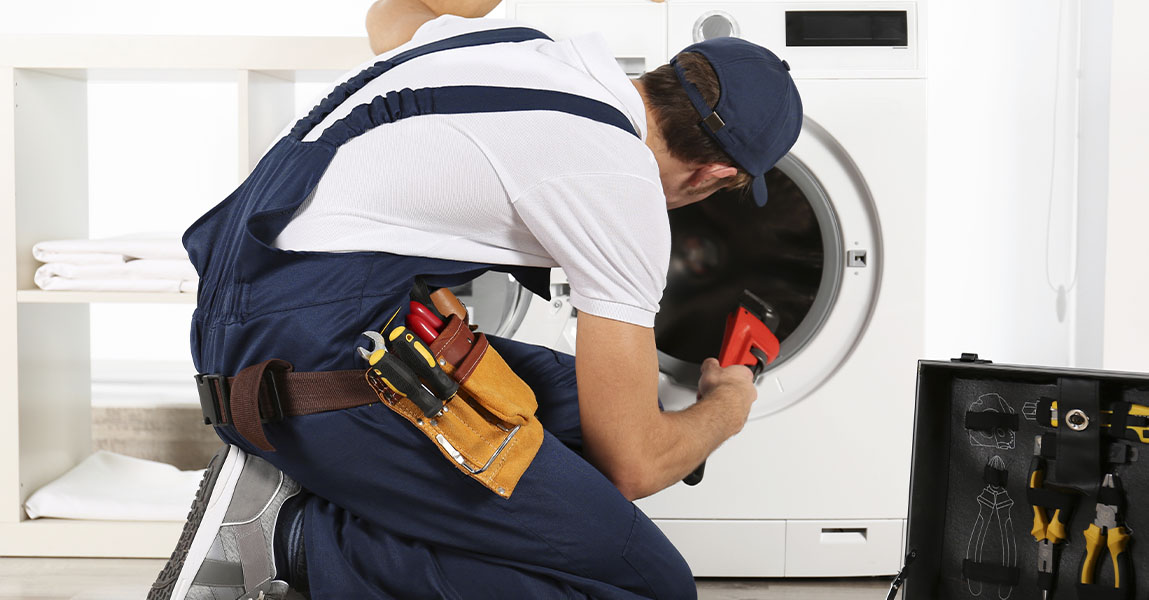Washers are built to handle heavy loads, yet they often develop problems that confuse us. One of the most frustrating issues happens when the machine stops spinning halfway through a cycle. At first, it seems like a minor glitch, but sometimes it signals a serious problem that needs quick attention. We at Quick & Pro Appliance Repair Glendale want to explain why this happens, how to spot early signs, and when it is time to call for help.
Common Mechanical Causes
Sometimes the reason is as simple as an unbalanced load. If clothing bunches together on one side, the washer senses the imbalance and halts the spin to avoid shaking itself apart. Rearranging the items and restarting often solves it. However, there are other mechanical parts that fail more quietly. A worn-out drive belt can slip mid-cycle, stopping the drum. Similarly, a faulty lid switch will trick the washer into thinking the door is open, which automatically cuts the spin.
Our team has also seen cases where the motor coupling fails, especially on older machines. This small plastic and rubber part connects the motor to the transmission, and when it breaks the spin stops completely. If you are unsure, looking into appliance repair Glendale services will give you professional insight before the problem worsens.
Electrical and Sensor Failures
Another major cause is electrical faults. Washers today rely on control boards and sensors to run smoothly. When a control board malfunctions, the cycle may stop mid-way with no warning. Likewise, speed sensors keep track of how fast the drum spins. If they misread the signals, the system shuts down to prevent damage. We have found this often appears after power surges or if moisture has entered the board.
One tip is to unplug the washer for a few minutes to reset the system. That sometimes clears a temporary glitch. But if the problem repeats, then it is more than a reset issue. In such cases, exploring washer repair in Burbank options is a practical step to get an accurate diagnosis and fix.
Issues Caused by User Habits
Our daily habits also play a role. Overloading a washer places strain on its motor and suspension system, which often forces the spin to stop. Detergent misuse is another overlooked factor. Using too much soap creates excessive suds that interfere with the drum sensors. This is why manufacturers recommend only a measured amount of detergent.
We also see that skipping regular cleaning leads to buildup of lint and residue around the drain pump. When the water cannot drain quickly, the spin cycle halts mid-way. Simple maintenance like wiping the gasket, cleaning the filter, and checking the drain hose goes a long way in preventing these interruptions.
Signs That the Problem Is Serious
Some warning signs should not be ignored. If the washer makes a loud grinding or banging noise before stopping, that often points to a bearing or suspension issue. A burning smell means the motor or belt is overheating, which can quickly escalate to permanent damage. Frequent cycle interruptions, even with balanced loads, are another red flag.
At this stage, waiting will only make the repair more costly. The safest approach is to have the unit inspected by professionals who can test electrical parts and mechanical components. If you reach this point, the best step is to contact us directly and schedule service before the washer fails completely.
Practical Tips to Prevent Mid-Cycle Stops
We can reduce the risk of these problems with simple habits. First, always sort laundry by weight and size to keep the drum balanced. Second, avoid cramming items into the washer, as air space is needed for proper spin. Third, measure detergent carefully according to the load size and water hardness.
It also helps to check the drain pump filter monthly, especially if you wash items like towels or pet bedding. Lastly, listen to your washer. Unusual noises, longer cycles, or repeated interruptions are early warnings we should not ignore. Acting early saves time, money, and frustration.
FAQ
Why does my washer stop spinning only with large loads?
This usually happens because the drum goes out of balance or the motor is under too much strain.
Can a washer spin issue fix itself?
In some cases, rearranging the load helps, but repeated stops mean a real mechanical or electrical issue.
Should I keep restarting the washer when it stops mid-cycle?
It is fine to try once, but if it keeps happening, forcing it may damage the motor or belt.
Is a burning smell during the spin cycle dangerous?
Yes, it suggests overheating and should be checked immediately to prevent serious damage.
When should I call for professional help?
If noises, smells, or frequent mid-cycle stops continue after basic checks, it is time for a professional inspection.

